I'd like to make you a promise: In business these days, the only thing you can count on staying the same is constant change. Are you cool with that? … The truth is you don't really have a choice — but let's talk about what you CAN do that will help you no matter what the future holds.
What I'm referring to is your ability to deal with change. And your ability to TALK about your abilities related to innovation and change management: developing, implementing, and getting executive buy-in & your co-workers' support for smart changes within your department, your organization, and your industry.
Why do companies change?
Because market forces change. The world economy changes. Innovators emerge with disruptive technologies. More profit is demanded from shareholders. There are many reasons.
So how does this all affect you, and your possibilities for getting hired?
As companies pivot their mission, develop new products to serve new markets, or generally look for newer, better, faster ways of doing things, your job and your role will likely morph and it will open the possibility for you to suggest or support better ways of doing things. And companies are looking for people who can do this; people who can adapt, contribute, manage and measure change. It’s an opportunity for you.
But are you someone who can anticipate changing biz trends and develop newer, bigger, better, faster, less-expensive, more-profitable products and services?
Maybe you are, but probably not! 😛 … and that’s totally OK. Nobody is expecting you to have a crystal ball and nobody is comparing your resume to Steve Jobs.
BUT … if you are interviewing for a new position (particularly at the manager or executive level) then you will face modern HR people who are trained to analyze your competencies for dealing with change and doing change management. They’ll pick you apart with behavioral interview questions.
Scenario
Imagine you’re in an interview and they are listening to your responses. Just imagine for a second that you have been asked a question — but YOU ARE TOTALY BLOWING IT — you’re not really giving them the answers (or indicators) they’re looking for. They’re taking notes on you, and putting a checkmark next to the behavioral competencies you FAILED to show:
- Did NOT specify that she had led a challenging change initiative with far-reaching organizational impact.
- Did NOT say that he had worked with high-level stakeholders or executives to solve an old problem in a new way.
- Did NOT mention that she had come up with innovative solutions or new ideas that are aligned with established company goals.
- Did NOT mention that he had acted as an agent of change within the department or organization.
- Did NOT discuss her role in creating enthusiasm around change and fostering an environment that encourages innovation and new solutions.
Example Interview Questions
"Can you describe a time you were involved in implementing a company-wide policy change? What was your strategy, what tactics did you use, and what was the outcome?"
"Tell me about a time when you thought that the standard way of doing things might not be the best way … What lead you to believe this? … How did you create and communicate your new solution? What issues did you run into with other people when trying to get things done? … Were you able to encourage others to see your suggested change as a positive thing — although perhaps your idea impacted their work in a significant way? What was the overall result?"
At this point in the interview you should have some "stories" (STAR Statements) in your metaphorical back pocket that you can whip out and speak to. Stories that show that you HAVE indeed led change initiatives, you HAVE worked with executive stakeholders to get their buy-in on your innovative new ideas, you HAVE indeed been able to tactfully communicate the WHY behind proposed changes — and you HAVE been able to get people to agree it's a good idea that will probably benefit them.
Don’t be the guy in the interview that gazes up at the ceiling and says “ummmmmmm, let me think for a sec …” — Have your STAR Statements ready.
So you’re not that guy after all. Because you are going to have solid STAR Statements prepared and you will remember to speak to the OUTCOMES of your stories; using metrics that show tangible business benefits, like this:
Sample Answers
"… So in the end we:
… decreased the expense of XYZ by 123%"
… achieved a reduction in turnaround time by about 33%"
… were able to spend about 40% more time on customer service"
… increased revenue for the department by 17% within 3 months."
… reduced the time required for the complicated XYZ process by 45% — and by way of our communication plan, everybody began to see that benefit. We used the successful initiative as an example to foster a company culture where individuals and teams are encouraged to innovate and we all embrace positive change."
Now here's what you should do to prepare:
Read the above sample questions, and jot down 3 or 4 situations from your work experience that you could use as examples. Now, for each situation you wrote down, turn it into a “story” that hits each of the points they are looking for.
Elaborate on your stories. Write them out so they have a beginning a middle and an end, and practice them out loud until you are proud of them and you “own” them.
If you can’t recall any time during your career that you innovated or managed change, then THINK HARDER … There’s got to be something! 😄 Even if your examples seem small or insignificant to you, the fact that you are using ANY examples to demonstrate behavioral competencies will give you an advantage over less adept candidates who may have more “big shot” stories than you do.
